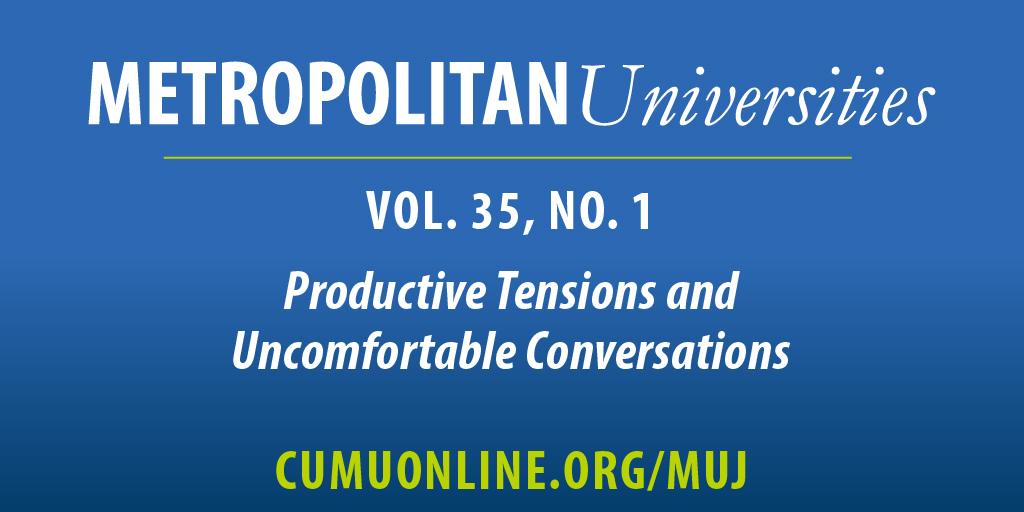Extractive Knowledge:
Epistemic and Practical Challenges for Higher Education Community Engagement
DOI:
https://doi.org/10.18060/27552Keywords:
epistemic justice, community engagement, Transformative LearningAbstract
Extractive knowledge is prevalent in higher education community engagement and is a type of epistemic injustice that is harmful to the marginalized communities and community nonprofits that many universities, particularly predominately white institutions, seek to engage. Extractive knowledge results from what we can think of as transactional relationships with community members or community nonprofits. These are largely superficial but impactful, relationships that perpetuate injustice in higher education spaces that imagine themselves to be working to create greater justice. This paper has two aims: 1. To develop the concept of extractive knowledge in community engagement, showing the ways that it is a type of epistemic injustice. 2. To share strategies and examples for more epistemically just approaches to community engagement that shape knowledge in ways that are epistemically responsible, in partnership with communities, and in alignment with community goals and outcomes. We provide the Fitz Center for Leadership in Community Practice Principles as an approach that can move higher education institutions toward transformative community engagement. The paper finishes with the Fitz Center’s Health Equity Program and another partnership as examples of the use of these Practice Principles to leading toward reciprocal, responsible, community-driven, transformational community engagement.
References
Boyle, Patrick. (2023, June 6). Do Black patients fare better with Black doctors? https://www.aamc.org/news/do-black-patients-fare-better-black-doctors
Center for Disease Control. (2021). Mortality in the United States. https://www.cdc.gov/nchs/products/databriefs/db427.htm
Code, L. (2020). Epistemic responsibility (Second edition). State University of New York Press.
Dawes, D. E., & Williams, D. R. (2020). The political determinants of health. Johns Hopkins University Press.
Collins, Hill P. (2009). Black feminist thought: Knowledge, consciousness, and the politics of empowerment (2nd ed.). Routledge.
Dotson, K. (2014). Conceptualizing Epistemic Oppression. Social Epistemology, 28(2), 115–138. https://doi.org/10.1080/02691728.2013.782585
Fricker, M. (2011). Epistemic injustice: Power and the ethics of knowing (Repr). Oxford University Press.
Fukuyama, Francis. (1999). Social Capital and Civil Society. International Monetary Fund. https://www.imf.org/external/pubs/ft/seminar/1999/reforms/fukuyama.htm
McHugh, N.A., Epistemic deadspaces: Prisons, politics, places. McHugh, N. A., & Doucet, A. (Eds.). (2021). Thinking ecologically, thinking responsibly: The legacies of Lorraine Code. State University of New York Press.
Mills, C. W. (2022). The racial contract (Twenty-fifth anniversary edition). Cornell University Press.
Ohio Department of Health Bureau of Vital Statistic. (2021). Infant Mortality Scorecard for Ohio. https://ohiodnr.gov/wps/wcm/connect/gov/c3f72479-5a00-43e0-a979-b10506a7a39f/Quarterly+Infant+Mortality+Scorecard+for+Ohio+July+2021.pdf?MOD=AJPERES&CONVERT_TO=url&CACHEID=ROOTWORKSPACE.Z18_K9I401S01H7F40QBNJU3SO1F56-c3f72479-5a00-43e0-a979-b10506a7a39f-nQbF.8S
Ohio Department of Health. (2021). Severe Maternal Morbidity and Racial Disparities in Ohio, 2016-2019.
Olivos, E. M. (2006). CHAPTER FOUR: Racism and Deficit Thinking. Counterpoints, 290, 41–59. http://www.jstor.org/stable/42979662
Omega CDC. https://omega-cdc.org/about/)
Pohlhaus, G. Varities of epistemic injustice. Kidd, I. J., Medina, J., & Pohlhaus, G. (Eds.). (2019). The Routledge handbook of epistemic injustice (First issued in paperback). Routledge, Taylor & Francis Group.
Rivzi, T. (2023). Hand in hand. https://udayton.edu/magazine/2023/07/community-builders.php).
Sakuda, C., Bohrer, K., Matos, C.A. (2018). Community and civic engagement in Catholic and Marianist Universities, https://marianistuniversities.org/wp-content/uploads/2019/12/amu_ce_white_paper_2018_rev_2019-10-22_cs.pdf.
Downloads
Published
Issue
Section
License
Copyright (c) 2024 Nancy McHugh, Samantha Kennedy, Ashley Wright

This work is licensed under a Creative Commons Attribution 4.0 International License.



